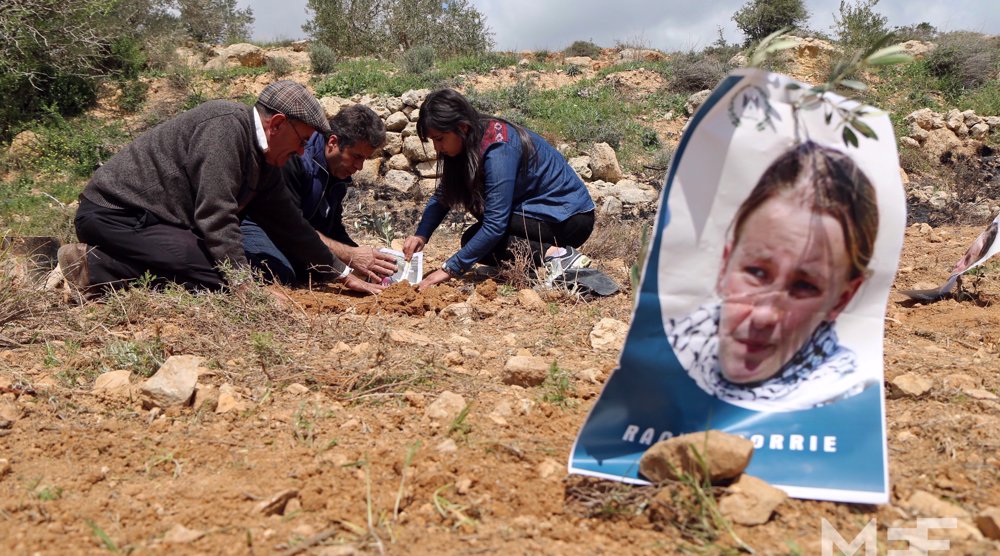On March 22, 2023, The Jerusalem Fund held an event to commemorate the 20th anniversary of the death of Rachel Corrie at the hands of the Israeli regime. Rachel Corrie was an American human rights activist and a member of the International Solidarity Movement (ISM). During the Second Intifada in the early 2000s, Rachel Corrie traveled with a group of ISM activists to Gaza to protest the Israeli occupation. On March 16, 2003, Rachel was killed by an Israeli bulldozer as she stood between the bulldozer and a Palestinian home to prevent its demolition. The event featured Rachel’s parents, Cindy and Craig Corrie, and was moderated by the Executive Director of the Jerusalem Fund, Jehad Abusalim.

The event underscored the issue of accountability and the dire need for a just legal system in the context of Israel’s occupation, where Palestinians and activists are subjected to unfair treatment without recourse to justice. This is not only a concern for the Corrie family, but a continuous issue for anyone who has been killed by the Israeli occupation. As Rachel’s parents noted, the pursuit of justice for Rachel requires striving towards the same justice that Rachel sought for the Palestinian people.
During the event, Craig Corrie shared insights on the various institutions that were approached in the pursuit of accountability for Rachel’s death. Initially, the family turned to the Israeli Military Justice system, which had pledged to conduct a thorough investigation and report to President George Bush. However, Israel closed the investigation without delivering a comprehensive report, citing that the drivers of the bulldozer were unaware of Rachel’s presence. Disappointed with the outcome, Cindy and Craig shifted their focus to diplomatic channels. In 2008, the Office of Overseas Citizens Services contacted the Corries, informing them that their requests for a full investigation had been disregarded. Subsequently, the incoming ambassador to Israel had assured the family that he would press the Israeli authorities for answers, but unfortunately, nothing came to fruition.
In addition to diplomatic efforts, there were attempts to prompt the US government to conduct its own investigation into Rachel’s death. This occurred when Congressman Baird introduced HCR 111, which called for three actions: 1) condolences to Rachel and her family, 2) a full investigation by the US, and 3) collaboration between the US and Israeli governments. However, the Department of Justice refused to launch an investigation in 2006, leading the Corries to file two lawsuits. The first targeted Caterpillar, Inc., the manufacturer of the bulldozer that killed Rachel, as well as other equipment provided to Israel. In 2007, this suit was dismissed on the grounds that determining whether Caterpillar facilitated war crimes would conflict with US foreign policy, as the US pays for and supplies Caterpillar equipment to Israel. The second and final route to justice pursued by the Corries was a civil lawsuit in Israel itself, accusing Israel of violating Rachel’s right to life. The court ruled that Rachel was accountable for her own death since she was in a restricted military area, and that the Israeli state could not be held responsible for actions taken during wartime. The inability to hold Israel accountable for Rachel’s murder illustrates a system intentionally designed to sustain the oppression and occupation of Palestine.
Despite the unsuccessful attempts to attain justice, Rachel Corrie’s legacy has left a deep and enduring impact. In the wake of her tragic death, the Rachel Corrie Foundation for Peace & Justice was established, serving not only as a reminder of her life but also as a platform to continue her tireless advocacy for human rights across the globe.
Rachel’s powerful words, “I couldn’t even believe a place like this existed,” serve as a reminder of the ongoing blockade and systemic oppression endured by Palestinians in Gaza at the hands of Israel, where their basic rights are frequently violated without consequence. To bring about change, we must honor Rachel’s activism by speaking out and demanding accountability from those in power, especially in Congress.
The life and work of Rachel Corrie must be remembered and upheld as a beacon of hope and a symbol of unwavering commitment to justice and peace. Let us take inspiration from her legacy to work tirelessly towards building a world where the fundamental rights of all are protected and upheld.
–
This summary was written by Alec Bogash, an intern at the Jerusalem Fund.


